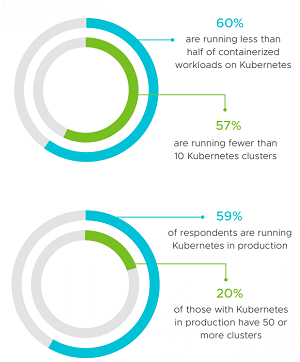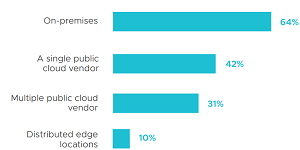News
Kubernetes Study: Still Early, Still On-Premises
VMware commissioned a study of the super-popular Kubernetes container orchestration system, finding that on-premises installations outnumber public cloud deployments for the 5-year-old project, described as "still very young" by the company.
"It's early days for enterprise Kubernetes adoption," says The State of Kubernetes 2020 report. "More than half of respondents (57 percent) are operating fewer than 10 Kubernetes clusters, and 60 percent are running less than half of their containerized workloads on Kubernetes. Early adopters of container technologies relied on other container orchestration tools (or no orchestration at all), and these environments remain in place. However, expect to see them supplanted by Kubernetes in the coming years. Kubernetes has all the momentum on its side."
The study was presented by VMware after it commissioned Dimensional Research to survey companies using Kubernetes with 1,000 or more employees, resulting in 247 qualified individuals.
Despite being only 5 years old, Kubernetes production deployment is strong, with the study stating "Early adopters are recognizing real benefits, and 59 percent of respondents are running Kubernetes in production. Of those, one-third (33 percent) are operating 26 clusters or more. One-fifth (20 percent) are running more than 50 clusters."
 [Click on image for larger view.] Kubernetes Production Deployment (source: VMware).
[Click on image for larger view.] Kubernetes Production Deployment (source: VMware).
The report also found on-premises installations outweigh public cloud deployments, despite the technology being associated with cloud-native operations.
"This result was surprising; we expected public cloud deployments to demonstrate a clear lead. We interpret this to mean that enterprises most often get started with Kubernetes on existing infrastructure, likely taking advantage of established virtual environments," VMware said.
 [Click on image for larger view.] Where Kubernetes Is Deployed (source: VMware).
[Click on image for larger view.] Where Kubernetes Is Deployed (source: VMware).
Other highlights of the report (free download upon providing registration info) include:
- The top reported benefit of operating Kubernetes is "improved resource utilization" (56 percent), followed by "shortened software development cycles" (53 percent) and "containerized monolithic applications" (50 percent).
- The top deployment challenge is "lack of experience and expertise" (70 percent), while the top management challenge is "lack of experience and expertise" (67 percent) and the top selection criterion is "ease of use" (64 percent).
- 49 percent of executives and 29 percent of developers said "integration of new and existing technology is the biggest impediment to developer productivity."
-
6 percent of executives and 29 percent of developers said "access to infrastructure is the biggest impediment to
developer productivity."
- 55 percent of developers have self-service access to Kubernetes resources, accelerating development.
- 83 percent of respondents say multiple teams are involved in selecting a Kubernetes distribution.
Kubernetes is often cited as one of more popular open source projects and has even been determined to be the fastest-growing project in the history of open source software.
Kubernetes was also featured prominently in a recent cloud-native development survey, which found:
- 1.7 million developers are using Kubernetes
- 60 percent of developers using orchestration are using Kubernetes
- 21 percent of developers using orchestration are using Containers-as-a-Service (CaaS) but not Kubernetes
- Developers not using Kubernetes use AWS ECS
About the Author
David Ramel is an editor and writer at Converge 360.